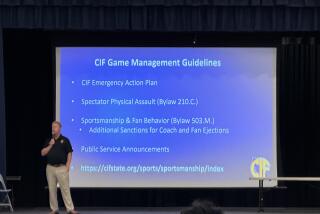Fingerprint Mandate for Coaches Is Rejected
The West Covina City Council on Tuesday night abandoned plans to require fingerprinting of every volunteer coach--from Pee Wee football to Little League baseball--to screen out sex offenders.
Instead, the council decided to let the 14 sports leagues operating in the city to make their own decisions on such checks.
The city agreed to provide the leagues with police assistance if they choose to adopt a fingerprinting program.
“I’m against mandatory fingerprinting by city ordinance,” said Councilman Richard Melendez.
Youth sports officials criticized the council’s decision.
“They are going to take a lot of heat for this,” said Anthony Garcia of the West Covina Bruins Football League, who said a mandatory program is the only way to guarantee the safety of children.
The council’s decision followed Community Services Director Tom Hatch’s warning that a mandatory fingerprinting program would leave the city facing possible lawsuits from people who believed that they had been wrongly identified as actual or potential sex offenders.
The decision came amid a growing belief nationwide that youth sports organizations are particularly vulnerable to child molesters, who use positions in leagues to prey on unsuspecting children and deceive trusting parents.
During the last two years, more than two dozen volunteer and paid coaches in Southern California alone have been convicted or arrested on suspicion of sexually abusing minors, according to news reports.
Although a handful of cities across the country require criminal background checks on volunteer coaches, none mandates fingerprinting. California law requires that all public school coaches be fingerprinted and permits volunteer leagues to submit coaches’ prints on their own for limited disclosure about certain violent felonies and sex crimes.
The American Youth Soccer Organization this year made background checks mandatory for its volunteers. And the California Youth Soccer Assn. will soon require fingerprinting for its 18,000 coaches.
But California officials say such efforts by sport organizations are minimal. Of the 1.3 million requests made to the state Department of Justice last year to have fingerprints checked, only a few thousand came from volunteer leagues, officials say.
West Covina’s plan would be the first to make the procedure mandatory for nonprofit leagues within a city’s borders.
Council members in West Covina, a San Gabriel Valley city of 101,000 a dozen miles east of Los Angeles, first broached their ambitious plan in April.
Since then, however, the Independent Cities Risk Management Authority--an insurance consortium representing West Covina and 28 other cities--has warned the city that it could be exposed to lawsuits and multimillion-dollar liability awards if it mishandled the prints, which would be checked against the state’s database.
Last month John M. Nielsen, the authority’s general manager, predicted that lawsuits would be filed because such mistakes in handling fingerprints are inevitable.
On Tuesday, the insurance group urged West Covina to pass an ordinance requiring the leagues to perform the fingerprinting themselves if they want to use city facilities. As part of this approach, the authority suggested that the leagues hire a professional fingerprinting company that could assume some of the liability if mistakes were made.
More to Read
Sign up for Essential California
The most important California stories and recommendations in your inbox every morning.
You may occasionally receive promotional content from the Los Angeles Times.











